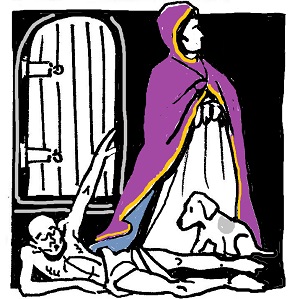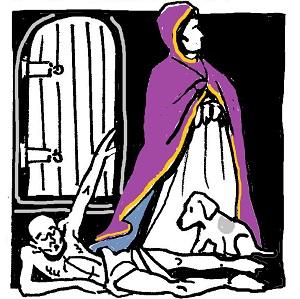

“Between us and you a great chasm is established” (Luke 16:26).
The parable in today’s Gospel is another of Jesus’ brilliant pleas to the Pharisees to recognize the inseparability of the great commandments to love God and neighbor. If we do not love our neighbors, we are separating ourselves from God. The details of the story are most compelling. A poor, homeless beggar named Lazarus lies at the very doorstep of the rich man, who literally has to step over him to go to one of his banquets dressed in purple and fine linen. Lazarus is not only poor and starving, but also covered with sores. The rich man apparently knows his name but pays less attention to Lazarus than the dogs that lick his sores.
The two men die and Lazarus is carried by angels to the bosom of Abraham, while the rich man is buried in the ground. He was already dead for lack of compassion, and when he dies, he ends up in Sheol, the underworld, without hope of the transcendent life Lazarus is now enjoying. He calls out to Abraham to order Lazarus to come down and ease his thirst, but here the parable reveals its shocking message. The distance the rich man put between himself and the poor during his life is the distance from God he will experience for eternity. A great chasm of his own making now exists, and it is too late to change it. Earthly compassion was the bridge he might have built between his good fortune and the needs of the poor, but he lived only for himself.
The story would also have confronted the Sadducees, the wealthy class in Jerusalem who used their conservative religious view that only the five books of the Torah were valid guides to justify their complacency about social justice. And because the Torah did not include belief in resurrection or any final judgment, these elites assumed that God had blessed them with wealth because they were virtuous, and so they lived earthly lives of insulated privilege with no concern for the poor. When the rich man begs Abraham to send a messenger from the dead to warn his five brothers, this may be an allusion to the five books of the Torah. Their legal assumptions were not enough to save them without love.
Jesus not only believed in resurrection, he warned his contemporaries that only compassion for others would qualify them for any afterlife with God, who is the essence of Mercy. This parable is similar to the Good Samaritan, which confronted the lawyers with the same message. If you do not respond to the suffering of someone in need as your neighbor, you will fail to observe the Great Commandment of love of God.
In the end, Jesus himself will be the messenger who returns to this world to warn that social justice and care for the poor are how we find life with God in this life and in eternity. He will rise from the dead, but not before he is rejected and crucified on the very doorstep of the holy city by those in power. The parable of the rich man and Lazarus cries out in warning to today’s crisis of income inequality, an exploitative global economy that creates billionaires on the backs of the poor and at the expense of the planet itself.
Now is the time to address the great chasm between privilege and poverty, extravagant lifestyles for the few in contrast to the desperation of the many, especially refugees, victims of war, human trafficking and the homeless poor on the streets of our glittering cities. The warning could not be clearer: The distance we establish between ourselves and our neighbors in need is the gulf we are creating between ourselves and our hope of heaven and intimacy with God. Only by beinging merciful will we be prepared to live in the beloved community created by Mercy in eternity.
Advertisement








